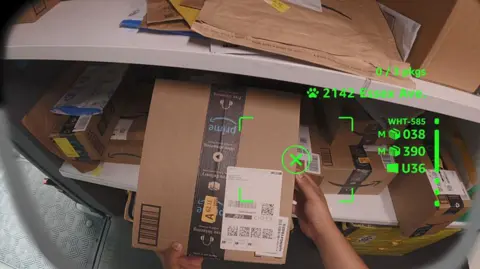Lily JamaliNorth America Technology Correspondent
 Amazon
AmazonAmazon has unveiled a prototype of artificial intelligence-powered smart glasses designed for delivery drivers.
The Amelia glasses have a camera and built-in display, and when paired with a vest, the driver can press a button to take a photo of the delivery.
“We're testing it in a number of locations with more than a dozen delivery service partners and hundreds of drivers across the country,” said Beryl Tomei, Amazon's vice president of transportation, at a presentation in Silicon Valley.
Amazon is the latest US tech giant to enter the increasingly crowded field of firms experimenting with wearable technology, but for now it's a product aimed at drivers, not customers.
While Amazon is still experimenting with the product, they plan to eventually make the smart glasses available to drivers, first in North America and then around the world.
Ms Tomai said drivers were “making real deliveries with them” to customers.
“We specifically designed it for this use case,” she added. “There’s a very specific application here.”
Asked by the BBC whether Amelia smart glasses could be sold to consumers at some point in the future, Ms Tomei did not rule out the possibility.
Amazon also unveiled a robotic arm that it says is designed to work alongside warehouse employees to sort packages with greater speed and accuracy.
The robot, which was used at a warehouse in South Carolina, will help reduce injuries and make the most of space in Amazon warehouses, the company said.
Amazon is also preparing to deploy artificial intelligence (AI) in its warehouses to manage operations and provide suggestions to workers to improve efficiency.
“It collects historical and real-time data across a building to anticipate bottlenecks and ensure smooth operations,” the company said.
 Amazon
AmazonInstagram and Facebook owner Meta has also experimented with smart glasses in recent years.
At the Meta Connect conference last month, the company unveiled a line of smart glasses powered by Meta AI technology, including a pair of Ray-Bans with a built-in display.
Unlike Amazon, Meta smart glasses are aimed at the mainstream consumer goods market.
Meta pitched the hardware as a technology that allows users to stay more engaged in the real world compared to smartphones.
For Amazon, Amelia smart glasses could improve the efficiency of the last mile delivery network.
Ms. Tomei said smart glasses can detect when they are in a moving vehicle and automatically turn off.
“We think this is important from a safety point of view. No distractions,” Ms. Tomei told a group of reporters at an event in California.
Ms. Tomei estimates the glasses can increase efficiency by up to 30 minutes per 8- to 10-hour shift, minimizing repetitive tasks and helping drivers quickly locate packages in their cars.
The smart glasses also come with a hardware switch on the controller that allows the driver to turn off the glasses and all of their sensors, including the camera and microphone.
Drivers “can opt out of this,” she said.









